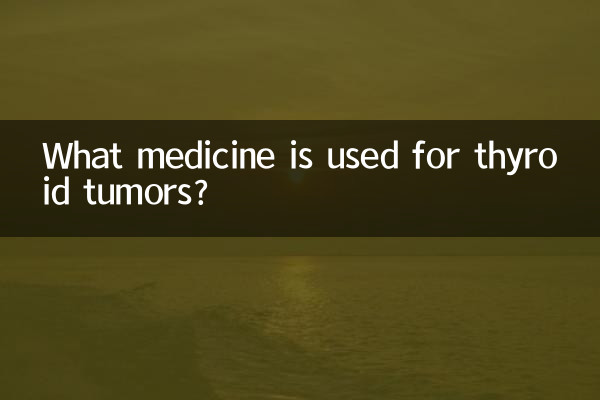What medicine is used for thyroid tumors?
Thyroid tumors are one of the health topics that have attracted much attention in recent years. With the advancement of medical technology and the development of drugs, treatment options for thyroid tumors are constantly being updated. This article will combine the hot topics and hot content on the Internet in the past 10 days to introduce you to the drug treatment plan for thyroid tumors in detail and provide structured data analysis.
1. Common types of thyroid tumors

Thyroid tumors are mainly divided into two categories: benign and malignant. Benign tumors include thyroid adenomas, while malignant tumors are mainly thyroid cancer. According to different pathological types, thyroid cancer is divided into papillary carcinoma, follicular carcinoma, medullary carcinoma and anaplastic carcinoma.
| type | Proportion | therapeutic drugs |
|---|---|---|
| papillary carcinoma | 80% | Levothyroxine sodium, radioactive iodine |
| follicular carcinoma | 10% | Levothyroxine sodium, targeted drugs |
| medullary carcinoma | 4% | Targeted drugs (such as vandetanib) |
| undifferentiated carcinoma | 1% | Chemotherapy drugs, immunotherapy |
2. Commonly used drugs for thyroid tumors
Drug treatments for thyroid tumors mainly include hormone replacement therapy, radioactive iodine therapy, targeted therapy and chemotherapy. The following are several commonly used drugs that have been hotly discussed on the Internet in the past 10 days:
| Drug name | Mechanism of action | Applicable type | Hot discussion |
|---|---|---|---|
| Levothyroxine Sodium | Replace thyroid hormone and inhibit TSH secretion | all types | high |
| Radioactive iodine (131I) | Destroy remaining thyroid tissue and cancer cells | differentiated thyroid cancer | high |
| Vandetanib | Inhibit tumor angiogenesis and growth | medullary carcinoma | middle |
| Lenvatinib | Multitarget tyrosine kinase inhibitors | advanced thyroid cancer | high |
3. Precautions for drug treatment
1.Levothyroxine Sodium: Thyroid function needs to be monitored regularly and the dosage adjusted according to TSH level. Overdose may cause osteoporosis and cardiac arrhythmias.
2.radioactive iodine therapy: A low-iodine diet is required before and after treatment, and is prohibited for pregnant and lactating women. After treatment, you need to be isolated for a period of time to avoid radiating other people.
3.Targeted drugs: May cause side effects such as high blood pressure and diarrhea, which require close monitoring and timely treatment.
4. The progress of new drugs that is hotly discussed on the Internet
In the past 10 days, the following new drugs have sparked widespread discussion on social media and medical forums:
| New drug name | R&D stage | Potential advantages | Attention |
|---|---|---|---|
| Selpercatinib | Approved | Targeting RET gene mutations | extremely high |
| pralsetinib | clinical trial | High efficiency and low toxicity | high |
| immune checkpoint inhibitors | exploration stage | activate immune system | middle |
5. Answers to Frequently Asked Questions by Patients
1.Do thyroid tumors require surgery?Not all thyroid tumors require surgery, and the decision needs to be based on the nature of the tumor and the patient's condition.
2.Can drug treatment cure thyroid cancer?Drug therapy is usually used for postoperative adjuvant treatment or for patients with advanced disease, which is difficult to cure when used alone.
3.Are targeted drugs expensive?Most targeted drugs are expensive, but some are included in medical insurance.
6. Summary
There are various drug treatment options for thyroid tumors, which need to be selected according to the type and stage of the tumor. Levothyroxine sodium is the basic drug. Radioactive iodine has a significant effect on differentiated cancer. Targeted drugs bring new hope to advanced patients. The continuous emergence of new drugs provides patients with more choices, but their use must be under the guidance of a professional doctor.
The content of this article is based on hot topics across the Internet in the past 10 days and is for reference only. Please follow your doctor’s advice for specific treatment options.

check the details

check the details